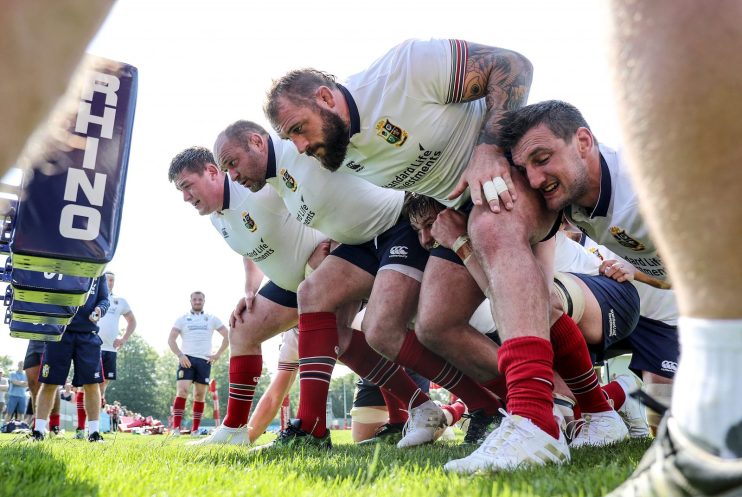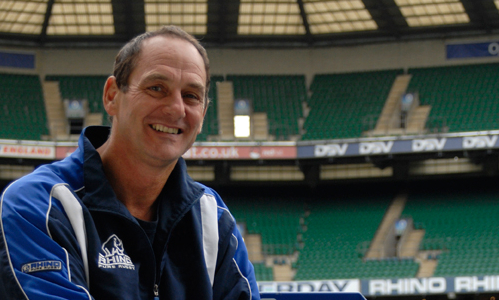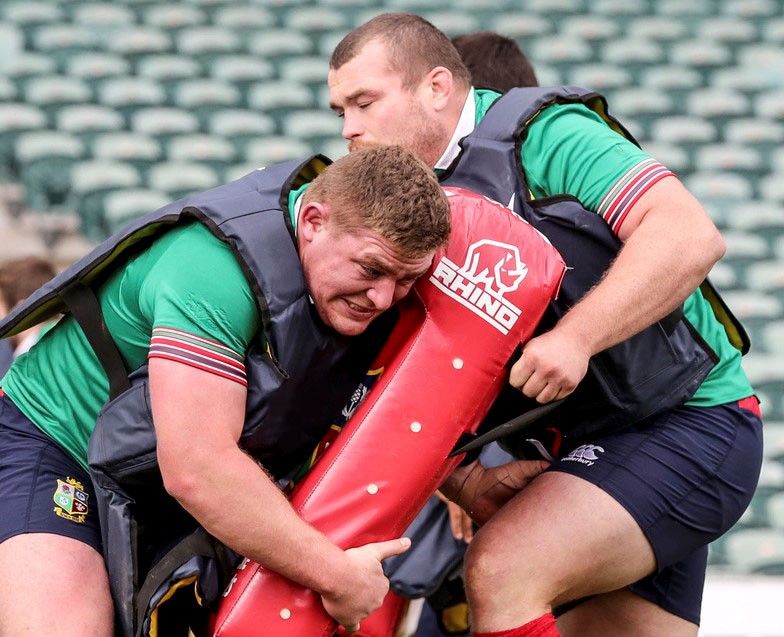Rhino boss Reg Clark on why rugby brand remains a good bet despite warehouse blaze and pandemic sales dip

It is just as well Reg Clark, boss of rugby kit maker Rhino, is the level-headed type.
Because 2020 has dealt the company the type of crunching blows that the world’s leading teams inflict on its scrum machines.
Already braced for another dip in demand as many of its markets fell into second lockdowns, Clark received a bombshell phone call early on Monday morning.
The previous night, a huge fire on a Cardiff industrial estate had ripped through two warehouses of Rhino stock. Around £2m of equipment was destroyed.
And all while Rhino is attempting to tempt investors with a bond issue.
“What a year,” says chief executive Clark. “Everything went up; a total write-off. It’s just one thing after another. As shitty a year as you can imagine.”
‘An 8-10 week hiccup’
Last weekend’s blaze, thought to have spread from a neighbouring tyre business, took 80 firefighters and 12 engines to bring under control.
Rhino has warned that orders may be delayed 8-10 weeks as a result, and is offering refunds to those unable to wait.
Yet it might have been so much worse. No one was hurt. The 40-year-old firm’s main office and factory in Cardiff are at a different location and were not affected.
The destroyed stock belonged to a licensee which, although important to the company’s global distribution network, means the loss is one step removed from the group.
More stock is on its way: a shipment of balls from India and apparel from other Asian suppliers was already on the water.
And if ever there was a time to have what Clark calls “an 8-10 week hiccup”, then this may be it.
“There’s certain times of the year when this would have been utterly disastrous,” he adds. “I’m not pretending it’s good news, but it puts it into the realms of the manageable.”
‘Tin hat time’, but Rhino ‘stays nimble’
Even before the fire, Clark was preparing for a tough winter.
The first lockdown caused royalties to fall 25-40 per cent in Rhino’s markets, which include the US, South Africa, France and Italy.
Ireland was down 80 per cent at one stage, before rallying.
As a company targeted at grassroots as well as elite sport, it was hit hard by disruption to school and university programmes.
“That’s a whole disappeared business,” says the 62-year-old.
In response, Rhino pivoted to selling more athleisure wear, home fitness equipment such as weights, mats and resistance bands, and branded facemasks for clubs such as Cardiff Blues.
“The only way to survive is to be nimble on your feet,” he says.
It also helped that their devolved business model keeps their overheads low. Staffing is lean and Rhino has not furloughed any employees yet.

Still, as second lockdowns began to take effect, Clark felt like it was “tin hat time” again.
“You tighten your belt,” he adds. “We will come out of this some time and you’ve got to hope there’ll be a bit of a boom. That people will be buying equipment, apparel and balls that they’ve postponed.”
Clark is critical of the government’s handling of the pandemic in relation to grassroots sport participation.
“There is the argument about the economic damage but I think sports people are mostly concerned about physical and mental health,” he says.
“Schools and universities I think have been particularly badly handled. But in general I favour taking some risks and embracing grassroots sport again. As soon as possible.”
Lions deal and bond bring cheer
Amid the gloom there has been some good news, though.
In September, Rhino was retained as an official supplier to the British and Irish Lions for their 2021 tour of South Africa.
Next summer’s tour will be the company’s fourth successive expedition with the Lions. Rhino has similar deals with England and Wales.
“The Lions of itself isn’t a massive effect on our trading. But it’s much needed good news,” says Clark, who hopes to fly out for the first two Tests.
September also saw Rhino redeem a tranche of bonds issued in 2015.
The project raised £500,000, enabling the company to buy out a rival in New Zealand.
“Having refinanced that bond, we decided there’s nothing to stop us keeping it open until the end of the year just to raise a bit more money in these uncertain times,” he says.
Clark says the response has been good, with more than half of bond-holders rolling over into the second offering.
He adds: “There’s no point in pretending it’s going to be a picnic but we will definitely survive.
“With interest rates drifting towards negative, we think 5.5 per cent is attractive to some people.”
Vaccine news ‘utterly transformative’
More good news emerged on Monday, just hours after Clark learned of the warehouse fire.
Stock markets soared at the prospect of an effective vaccine for Covid-19 becoming available within weeks.
Clark calls it “a lifeline” for businesses “and not a moment too soon”.
He adds: “There’s a kind of Dunkirk spirit. The first lockdown, everyone was in it together, ‘we can get through this’.
“But I think at the start of the second one, there was a genuine feeling of ‘crikey, is this ever going to end?’.
“And the vaccine news has just been utterly transformative, for all businesses including sport. You can see the light at the end of the tunnel.”

While Clark was bullish about the bond anyway, this can only help.
“We got the bond away in the most difficult market conditions imaginable. So the bond is done. Anything we get now is a bonus,” he says.
“Overall, I don’t think there’s any reason to take a negative view on it. I’m not pretending the fire’s good news, but it’s a blip.
“It doesn’t really have a material effect on the group. And the news of the vaccine is fantastic for us.”
For more information on Rhino Rugby Bonds click here.
